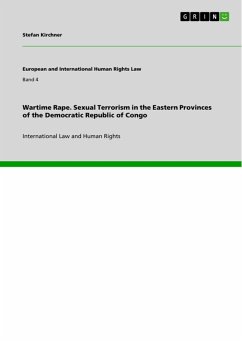Document from the year 2008 in the subject Law - European and International Law, Intellectual Properties, Université Paris-Sorbonne (Paris IV) , language: English, abstract: About 5.4 million people have been killed in the wars in the Democratic Republic of Congo (D.R.C.), the former Zaire. 45,000 die every month and hundreds of thousands of women have been raped here in recent years. Wartime rapes are anything but new and have been employed not only to terrorize the population but also as weapon of genocide in Rwanda, Bosnia and Darfur. The Eastern Congolese provinces of North and South Kivu have been affected by particular gruesome acts of violence and thousands of victims suffer from rape-induced fistulae, ruptures of the walls which separate the victim's vagina from her rectum. According to UN staff and doctors in the region, all armed groups in the region are involved in rapes and despite the 2002 Pretoria Accord which put an official end to the war, attacks and rapes continue to this very day. Many survivors are forced out of their homes and their families abandoned and left to fend for themselves. Therefore, apart from medical treatment and psychological counseling, there is a strong demand for justice. But due to the weak position of women in Congolese society, justice is much harder to get by than medical treatment. Although the Congolese Penal Code and Military Penal Code penalize these crimes, the reaction by the Congolese government to the atrocities remains insufficient, making a solution based on Congolese criminal law unlikely. The practical application of the D.R.C.'s domestic laws is found wanting and the law does not have the deterrent effect which is required to prevent future atrocities, also due to the traditional position of women in Congolese society continues to be reflected in the law: According to Art. 448 of the D.R.C.'s family code, a married woman has to obtain her husband's permission to bring a case to court - which provides a major obstacle on the road to justice. This book deals with the multidimensional aspects of the problem, which range from medicine and psychology to social issues and the quest for justice. In the latter part we will examine not only the background by looking at relevant rules of International Human Rights Law and International Humanitarian Law but also look at legal responses to these crimes both on a national level in the D.R.C. as well as on an international level and with the question of how justice can be achieved for rape victims in a country ravaged by war in which women continue to be second class citizens.
Dieser Download kann aus rechtlichen Gründen nur mit Rechnungsadresse in A, B, BG, CY, CZ, D, DK, EW, E, FIN, F, GR, HR, H, IRL, I, LT, L, LR, M, NL, PL, P, R, S, SLO, SK ausgeliefert werden.









